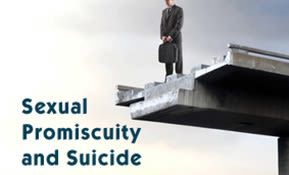
The Co-Dependent
Every day thousands of unsuspecting hearts are being crushed by the discovery that the person they trusted the most in life has been living a secret life of deception…

Is your partner a sexual-addict? Every day thousands of unsuspecting hearts are being crushed by the discovery that the person who they trusted the most, their beloved, has been living a secret life of deception and lies. If you and your family are suffering due to the sexual behavior of your partner, you are not alone. Sexual addiction has reached epidemic proportions.
Co-Dependent: My husband is spending hours watching pornography on the internet. I know that he’s writing and instant messaging somebody but I can’t prove that he’s done anything more.
Therapist: Is he willing to go for help?
 Co-Dependent: No. He doesn’t think he needs help. He tells me that it’s all my fault.
Co-Dependent: No. He doesn’t think he needs help. He tells me that it’s all my fault.
Therapist: What do you mean?
Co-Dependent: He says that I’m cold. Maybe he’s right. I have lost interest in him. We went to a Rabbi for help, but we just talked about my problem. The Rabbi doesn’t know anything about my husband. I have been lied to and manipulated so much that I feel crazy. I feel numb to what I’m feeling. I don’t know what’s real anymore. Should I tell the Rabbi?
If that sounds like a strange question to you – it wouldn’t if you were suffering from sexual co-dependency or co-addiction. Co-dependent people tend to deny and minimize their own feelings and compromise on their own values to avoid the anger, criticism or abusive behavior of an addicted spouse.
The Rebbe’s Advice:
Rebbe Nachman teaches us that self-healing begins when we realize that the answer to life’s challenges are not to be found “out there” but “in here”, within ourselves. Our educational system, though technologically sophisticated only fills us with external knowledge from teachers and books. Rare is the teacher (like the Rebbe) who helps us to uncover our own G-d-given abilities and to delight in discovering our own special way of coping with every single challenge of life. We just cannot ignore this Spiritual truth when we are working to heal our lives. The Rebbe teaches that only by turning to G-d as He manifests Himself uniquely within us, and not hooking our self-esteem onto something external (like people-pleasing) can we learn to overcome life’s challenges and live in alignment with ourselves.
Applying the Rebbe’s Advice:
The Rebbe teaches us in Torah 34 that we need to find our unique specialness that no one else has and share it with the world. Rifka (name changed) found her unique specialness in the challenge of her husband’s addiction, which today, she refers to as the greatest Blessing of her life. How could this be? Rifka agreed to this interview in order to spread her message of hope:
Therapist: Can you tell us what went through your mind when you discovered your husband’s problem?
Rifka: I wondered if I should leave him or not…was he a danger…what would I tell the kids if I left.
Therapist: What made you decide to stay in the relationship and how was it possible for you to cope while your husband was still sexually acting-out?
Rifka: My Breslever Rabbi encouraged me to give it time and to attend S-Anon meetings. I met a woman, at a meeting. I was impressed with her Emunah, strength and the way she spoke. She told me how she coped with her husband’s addiction; how her husband became sober; how he’s stayed clean for 22 years, and how great their marriage is today. I thought that that was amazing. I immediately asked her if she could be my S-Anon sponsor and B”H she said yes.
Therapist: That is amazing. Can you tell us what your S-Anon sponsor advised you to do?
Rifka: She taught me to take my focus off my husband and to put it on myself. I learned to get my needs met without him. I learned to accept life on G-d’s terms (not mine) which meant that I wasn’t going to be able to fix my husband, but I could work on myself. Through G-d and the program I became less afraid to know my feelings and to communicate them directly to my husband.
Therapist: And what would be some examples of that?
Rifka: I started telling him immediately if I didn’t like the way he was speaking to me. I would say “you cannot speak to me that way” and if he continued speaking abusively I walked away.
Once, we were going to be late for something. Instead of waiting for him, I just left and we went in separate cars. He got very angry about this, but eventually he had to start looking at himself. He realized that we were no longer joined at the hip.
Therapist: How did you cope with his sexual-behavior? Did your physical relationship continue?
Rifka: Yes ours did, although some couples, need to go through a period of abstinence. I learned that I didn’t have to be affectionate if I was not feeling affectionate and I refused to participate in sexual-activities that made me feel uncomfortable. Now I know that my worth and desirability don’t depend on what he thinks of me, but on what I think of myself.
Therapist: How did your husband respond to your growth and change?
Rifka: My husband has, Baruch Hashem, been sexually-sober and a member of SA for a few years. I know that he felt he might lose me. I made a lot of friends in recovery and eventually went back to school and started working. I gained a lot of self-esteem by doing esteem-able things for myself! I just did them – I didn’t ask for permission. I was preparing myself for the possibility that my marriage might not last. Thank G-d it did.
Therapist: Are there any other ways that you helped yourself?
Rifka: When I first found out about my husband, I went to a Breslever Rabbi. He told me that my husband wasn’t a bad person he was a sick person who could be helped if wanted help. He told me that someday I would see this whole thing as great gift from Hashem, because it was literally the key to my Tikkun Neshoma, to my soul correction. He was so right! I cannot express the joy I feel now in spreading my message of encouragement and hope to other women. I know that this is why I was brought into the world.
Therapist: What is your advice to women who are still suffering with this?
Rifka: Realize that this problem is too much for you. You cannot handle it by yourself. You are going to need the help and support of others. Hashem is sending you a message to take action now. There are S-Anon meetings everywhere. Make this your number one priority. A preferably female therapist can help if she really understands addiction and co-dependency (most don’t). And, this is a must – find yourself a Breslever Rabbi and Spiritual Guide.
If you are still suffering, May Hashem help you to really hear this message and act today!
http://www.sanon.org/
http://sa.org/
http://www.sexhelp.com/
http://www.guardyoureyes.org/







Tell us what you think!
Thank you for your comment!
It will be published after approval by the Editor.